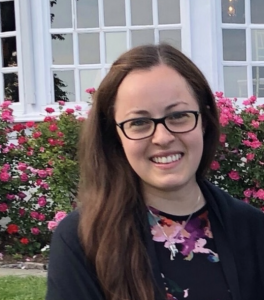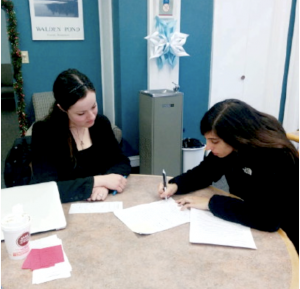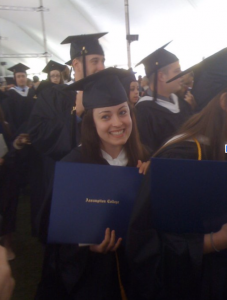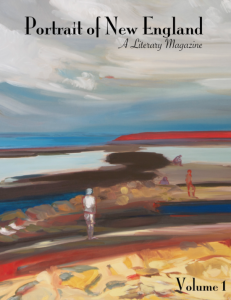Hounds with Purpose is a space for alumni to share their stories of purpose and vocational engagement beyond their years at Assumption. This blog is created by the Center for Purpose and Vocation and the Career Development and Internship Center (CDIC) to better connect students and alumni through experiential storytelling.
From Small Town to Greyhound:
Discovering Passion & Purpose at Assumption College

On so many levels, Assumption opened up the world for me.
As a first-generation college student coming from a small town, I had no frame of reference for what college academics would be like. I was relieved to discover that freshman year could be a time of exploration. I lived in Hanrahan Hall and enjoyed meeting other intellectually curious students. Also, I took many standard introductory courses, joined Band and Chorale, and briefly tried my skills on the rowing team.
The standout course from my freshman year was easily English Composition, with Professor John Hodgen. I had always earned high grades on essay assignments, but this course brought writing to a new level. We were encouraged to stay close to the texts we read, mark them up, notice what the good writers did. Then, we got to compose all different types of essays: extended definition, comparison/contrast, creative stories. Little did I know, this course was planting a very important seed that would ultimately guide my entire life.
While freshman year afforded me the time to adjust to college life, I distinctly remember sophomore year as the defining point of my undergraduate education. After moving back home and becoming a commuter, I suddenly had more limitations on my schedule; I had to factor in driving, my work hours, and the timing of my campus activities. Second semester, I was having trouble finding an elective to fit a specific time-slot when I would be on campus. Determined to avoid a science course at all costs, the only possible fit was “Romanticism,” a level 300 English course. I had been following the trajectory for a Global Studies major, but I was emboldened by my English Composition experience, so I registered.
On the first day of class, Professor Paul Ady asked, “Who here is an English major?” Over 20 hands shot up—everyone’s but mine. That probably should have made me nervous, but it didn’t. We jumped into the material: Goethe’s Faust, Keats’s “Ode on a Grecian Urn,” Alexander Pope’s “An Essay on Man.” To say I was captivated is an understatement; thinking about that course swells my eyes to tears to this day—after all, it changed everything. “Doing essays” became crafting thebest possible compositions I could. “Reading” meant studying the words, marking up my book, thinking—truly thinking–about what the authors were trying to convey. I couldn’t get enough.
From there, the rest is history, as they say. While it was a bit late in my coursework to change my major (I was also enjoying the economics, geography, and political science classes in the Global Studies program), I decided to pursue a third minor in English. Once my writing was noticed, I was recommended to be a writing tutor, and eventually a head tutor, in the Academic Support Center—another planted seed for things to come. Junior year, I applied for an editorial internship at an ad agency and got it. At “DGuides,” I was fortunate enough to earn my first bylines composing travel guide entries about Boston. I began to truly think of myself as a teacher and a writer: two important identities that came to define me.
After college, I began working for Tocci Building Corporation as a Technical Copywriter and was accepted to the English Composition M.A. program at the University of Massachusetts, Boston.
While I gained important industry experience at Tocci, I swiftly realized that office work wasn’t for me; instead, I was drawn to participate in my master’s program more fully and take advantage of the teaching assistantships offered.
While simultaneously teaching intensive ESL at a school in Boston, I served as a TA for a freshman composition course and took classes in the evenings. During the second year and beyond, I also worked as a writing tutor for Curry College, Framingham State University, and local private students. I started noticing the profound sense of comfort that comes over me while teaching in a one-on-one capacity.
After graduating from UMass Boston, I landed right back at Assumption teaching freshman English courses. It was during this time that my side-gig of tutoring privately became more of a commitment. I began getting multiple referrals from happy parents, and soon one student turned into two, then four, then eight. With a business blossoming, I pivoted to a more flexible course schedule at Northeastern University. I have been there ever since, teaching a variety of business English and composition courses, such as Literature & Business Leadership, Writing for the Professions, and College Writing.

Tutoring a college student at Framingham State University.
To make a long story a little shorter, I continued teaching and tutoring, focusing on delivering excellent courses and growing my business. Today, I still teach at
Northeastern and have also recently earned ABD status within the University’s Doctor of Education program. What’s more, my tutoring business, Brett E. Murphy Tutoring & Consulting, Inc. has become well-known in the suburbs of Boston. We offer homework support, college counseling and essay help, and tutoring in a number of other subjects. There are seven of us—three of which are Assumption alums!
Continuing to keep up with my own writing, which has always been quite important to me, I have published in HuffPost, RiverRiver, The Teaching Professor, Shakespeare in Southern Africa, and other mediums. Recently, Jon Bishop ‘11 and I also founded Portrait of New England, an online literary magazine that debuted its first issue this past summer. It has been, and continues to be, a labor of love—merely something positive to put into the world to further an appreciation of quality literature and art. Many people have asked what inspired this project, and we answer by citing our penchant for the humanities, strong friendship, and passion for creating—cultivated by our liberal arts education.
Looking back, many aspects of my Assumption experience inspired my calling to be an educator, writer, and businessperson. Besides the quality education I received, the wonderful people of my alma mater revealed many lessons—some of which were immediately apparent and others that I grew to appreciate with time. First and foremost, I am tremendously grateful to those in the English department for sparking something inside me that I didn’t fully know was there. Beyond that, in the Global Studies/Economics department, Professor Kevin Hickey showed me that it’s possible to hold learners to a high standard of excellence, but still be fair—a teaching style I aim to emulate every day with my own students. Professors Smriti Rao and Colleen Fahy allowed me to realize I could tackle difficult, math-based Economics problems, even though I never thought of myself as a “math person.” In the Political Science department, Professor Bernard Dobski guided me toward what critical thinking truly means; I’ll forever remember dissecting texts in “Peace and War” and hearing him tell us that if we took away one thing from education, it should be learning how to think. During my “Moral Theology”course, Father Stephen Toracco helped me to understand a clear path to moral decision-making in all aspects of life. In the Academic Support Center, Alan Bruehl afforded me the opportunity to see tutoring as important and something that could shape a career. At first glance, only some of these takeaways seem related to my line of work; however, I’d argue that they are all quite relevant. Not all of them can be quantified with an exact metric, but they have indeed made all the difference.
When you look at any college’s marketing brochure, you’ll never be able to find a statistic that can communicate whether graduates leave as better people, but I can tell you for certain that is how I left Assumption. As an 18-year-old applying to schools, I truthfully had no idea what a liberal arts education was. But in hindsight, I selected for myself a most valuable springboard for my future; Assumption offers not only an education in the traditional way we think of it, but a formative early-life experience. The problem is, this type of experience is downplayed in the cultural conversation, where critics call into question the value of a liberal arts education. Lately, it seems endless news articles emerge offering reports on what schools and programs provide the best “bang for your buck,” or detailing which majors result in jobs with the highest salary upon graduation. Of course financial consideration for a sizeable expense is merited, but such reductive treatment of an education exhibits one of our worst societal ills: obsession with the end result at the expense of the journey. We don’t research the ROI before we have children; we don’t calculate whether our life will be 4x or 5x happier before we book a trip to a faraway land. Some things just add goodness, richness to our lives. Then, the results follow. In my case, the end results of achieving purpose, employment, and graduate education came seamlessly after my undergraduate experience at Assumption.
In the near future, I will be taking on a new challenge: teaching writing within Assumption’s MBA program (still lecturing at Northeastern, still writing my dissertation, still running my tutoring business— I’m a card-carrying workaholic!). Through trial and error, many different professional experiences, and much introspection, I have come to realize that I am happiest and at peace with myself when I am writing or teaching others how to write. These activities give me purpose.
Such careful and frequent reflection on our lives is important. In fact, being around younger people for mostly every day of my life, I think quite a bit about what I wish I knew when I was their age and what advice I can offer to help. The first thought that comes to mind is not to worry too much, but, as a worrier myself, I also don’t think that’s fair to those growing up right now; times are trying, and it can feel scary to try to make your way in this world. So secondly, I consider what has fueled my best choices, my pivotal moments.
I would offer this: there is always a way.
When you aren’t getting what you want, consider what options you haven’t exhausted. For instance, one complaint I hear a lot is frustration with not receiving responses from internship or job applications. In reality, applying to posted positions is only a marginally-active way of job-seeking that pits you against the masses. Apply to these, sure, but in the meantime, research organizations and professionals that interest you and reach out to them. Tell them (politely) you are a passionate and hard-working young person, you know and love their mission, and “Would you have a short period of time out of your busy day to talk to me about any future opportunities?” First person doesn’t respond? Find another. Try again. Do it again. Do it again. Do it again.
In any situation, think about what more you can do. Keep trying. You have it in you. There is always a way.

Rome, 2019
Oh, and another thing: whenever you can possibly manage it, try to move yourself around and into new situations. Whether traveling to other parts of the world, the country, the state, or even your own community, nothing will rattle you into growth, change, and action like seeing new corners of this Earth. In my Rolodex of memories thus far, the moments that made my heart soar and plummet were not spent on my couch scrolling Instagram (believe me, I have to remind myself of this often, too).
I’ll leave you with one final note. I’ve realized that there is a subtle message sent to us —at least in American society—that, somehow, life hasn’t really started until school ends, and your education is just prep time for the real deal.
You have to go to elementary school, to go to middle school, to go to high school, to get into college, to get into a great job, and THEN you can really live, right? That’s when the fun starts? When we suddenly find happiness and everything falls into place?
After your education ends, whether that’s after high school, college, or graduate school, there are no fireworks. In fact, you won’t feel a whole lot different—different day, different challenges, maybe, but same you.
Because here’s the thing. You are already living. It’s so easy to fall into the trap that people are traveling more, doing more, living better, living larger, and someday we’ll get there—wherever THERE is. But don’t fall for it. What you do in your community, your school, your workplace, will be some of the more important, meaningful aspects of your lives. That’s good news! Because purpose is right in front of you, and chances are you are already working with it. It’s not 20 years away when you’re finally a CEO. It’s not going to jump out at you when you finally find that perfect job. For me, I can honestly and truly tell you it surfaces in the smaller moments: when my students improve their paragraph structure after a lesson, when any of my writing is selected to be published, when my Northeastern graduates tell me my class was meaningful to their education.
The time is now. It’s today. It isn’t after college, graduate school, or any other arbitrary life milestone.
Just remember: your beautiful life has already started.
| Brett is the owner of Brett E. Murphy Tutoring & Consulting, Inc., as well as a lecturer and doctoral student at Northeastern University. She can be reached at brettmurphy31@gmail.com. |



